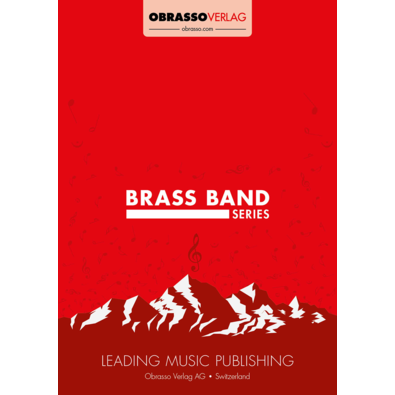Results
-
£35.00
WHAT I DID FOR LOVE arr C Wormald
Estimated dispatch 7-14 working days
-
 £62.99
£62.99All I Want For Christmas Is You - Mariah Carey & Walter Afanasieff - Frank Bernaerts
Estimated dispatch 7-14 working days
-
 £62.99
£62.99I Was Made For Lovin' You
Estimated dispatch 7-14 working days
-
£44.95
DEUS INVICTUS - GOD UNCONQUERED (Brass Band Set) - Andrew Mackereth
Deus Invictus draws its inspiration from well-known words from Romans 8: 38-39; 'For I am convinced that neither death nor life, neither angels nor demons, neither the present nor the future, nor any owers, neither height nor depth, nor anything else in all creation, can separate us from the love of God'. The music reflects the confidence and certainty of the scripture text while, as in everyday life, trials and tests come along which are reflected in a sequence of musical skirmishes. The work introduces the 19th century hymn 'St Albinus' to a wider audience and also includes references to the tunes 'St Margaret' and 'Rachie'. A setting of the Easter Hymn, 'Christ the Lord is risen today!', is heard followed by a final reprise of 'St Albinus'.
Estimated dispatch 7-14 working days
-
 £54.20
£54.20All I Want For Christmas Is You - Mariah Carey, Walter Afanasieff - Peter Ratnik
Estimated dispatch 5-10 working days
-
 £50.90
£50.90I Only Have Eyes For You - Harry Warren, Al Dubin - Alan Fernie
Estimated dispatch 5-10 working days
-
 £64.00
£64.00I Was Made For Lovin' You - Desmond Child
Estimated dispatch 5-14 working days
-
£75.90
I Only Have Eyes For You - Harry Warren
Estimated dispatch 5-14 working days
-
 £70.00
£70.00All I Want For Christmas Is You - Mariah Carey
Estimated dispatch 5-14 working days
-
£44.95
Deus Invictus - God Unconquered (Brass Band - Score and Parts) - Mackereth, Andrew
Deus Invictus draws its inspiration from well-known words from Romans 8: 38-39; 'For I am convinced that neither death nor life, neither angels nor demons, neither the present nor the future, nor any owers, neither height nor depth, nor anything else in all creation, can separate us from the love of God'. The music reflects the confidence and certainty of the scripture text while, as in everyday life, trials and tests come along which are reflected in a sequence of musical skirmishes. The work introduces the 19th century hymn 'St Albinus' to a wider audience and also includes references to the tunes 'St Margaret' and 'Rachie'. A setting of the Easter Hymn, 'Christ the Lord is risen today!', is heard followed by a final reprise of 'St Albinus'.
Estimated dispatch 7-14 working days
